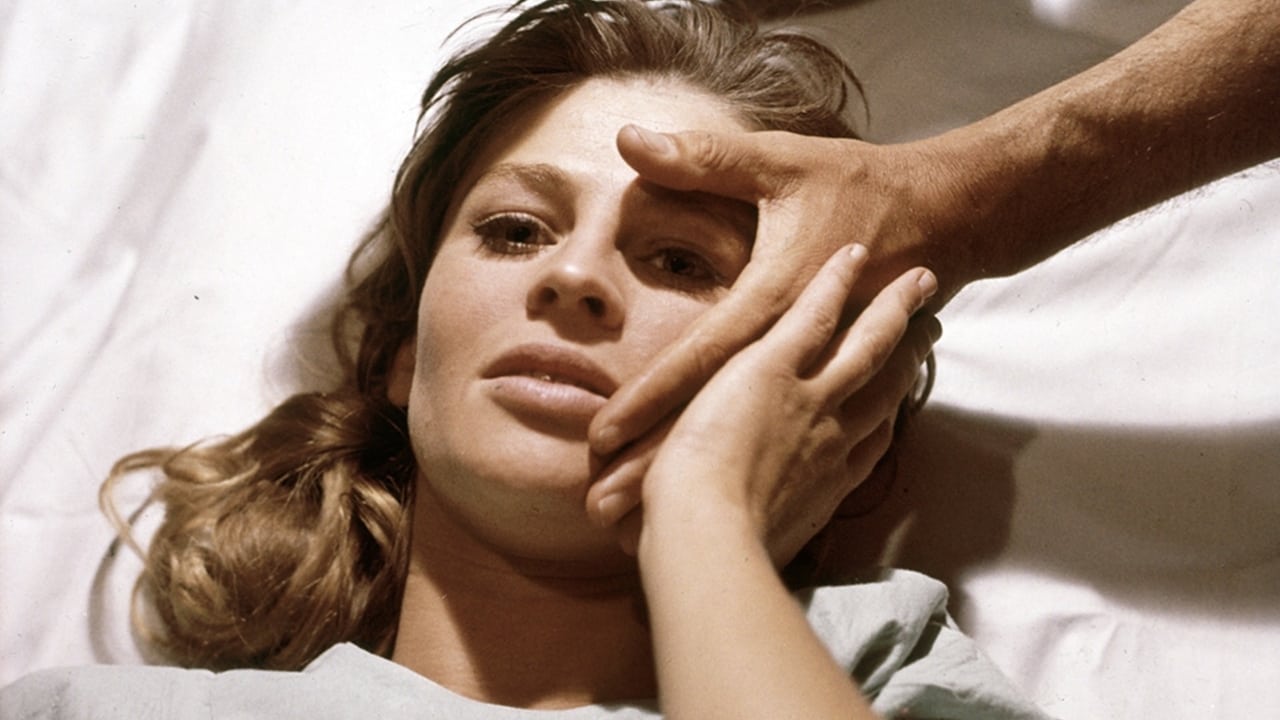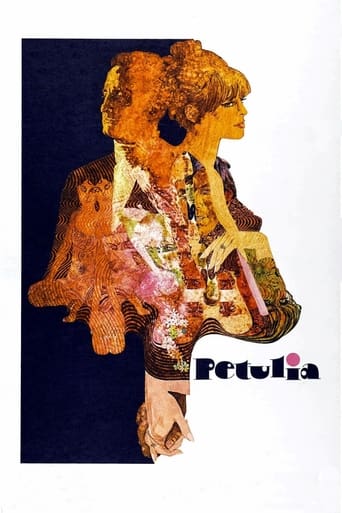

Too much of everything
... View MoreThis movie was so-so. It had it's moments, but wasn't the greatest.
... View MoreEach character in this movie — down to the smallest one — is an individual rather than a type, prone to spontaneous changes of mood and sometimes amusing outbursts of pettiness or ill humor.
... View MoreIt's a good bad... and worth a popcorn matinée. While it's easy to lament what could have been...
... View MoreI went into this film not really knowing what to expect. The story looked like a 60's matinée love story of adultery and betrayal, but it seemed to me that there was something more, that lurked under the surface. Armed with Roger Ebert's favorable review, I decided to give it a go, and something which doesn't happen too often to a seasoned film buff, happened here, as I floated into the world of Petulia. I was more than pleasantly surprised with originality and distinctive, yet peculiar flavor of this film. Richard Lester, best known for his work with the Beatles, used his senses and the feel of the times, to create a near masterpiece that blended simple love story with torment, escapism and ridicule of the society, love, hate and aggression, misunderstanding and care, all wrapped up in San Francisco of 1967.The use of counterculture, Janis Joplin appearance, Grateful Dead and their communal entourage, against the backdrop of uniformed man and women, in military and nun's outfits, all underlined the deeply divided American society of the Vietnam era, which was worlds apart from one another, same as Petulia and Archy, two lovers that were destined to lose. Richard Chamberlain is perfect in the role of psychotic husband and this is his most layered role that I know. Look at him in this film and you'll never see Dr Kildare again. Film of so many meanings and profound styles. As Richard Lester told the producer Raymond Wagner after the screening of the finished film: "Ray, no one may ever see this movie or understand this movie, but at lest our blood is on every frame of the film, and we did the very best we knew how". Worth keeping.
... View MorePetulia opens with a shot of a middle-aged woman in a wheelchair, then cuts to a sixties' rock club featuring a very young-looking Janis Joplin. The sixties counterculture definitely torpedoed middle-aged women. Their husbands, like Archie, the middle-aged doctor played by George G. Scott, have the luxury of deciding they're "tired" of being married and jumping into affairs with younger women. This is a cause of continuing sadness to his ex-wife Polo, wonderfully played by Shirley Knight. Archie becomes involved with Petulia (Julie Christie), a clichéd "kooky" young woman of a type that often appeared in films of this period. Petulia is married to an abusive, wealthy husband, David, played with suitable evil by Richard Chamerlain. Christie is such a good actress that she gives some dimension to the role, although she's far outshone by Knight as Polo, the wounded wife. In its technique and attitude it really is a European or British film shot in San Francisco with American actors. There are interesting cultural references to the sixties, that may have seemed daring at the time, but now seem more innocent than anything else. The film is really about Archie and men of his generation and their bewilderment at the changing cultural mores represented by Petulia. On one hand they're delighted to feel that they can have sex with no responsibilities, but Petulia, for all her charm brings nothing but chaos into Archie's life. Was it really worth for him to be involved with her? And he ends up stuck with a high maintenance greenhouse in his apartment.
... View MorePetulia is one of those films that some critics find creative because it takes the story plot line and presents it in a non linear manner. We're all supposed to think that's creative when in fact all it is is confusing. This is what passes for art.That being said had the film been presented in a straightforward manner I might have found more to like in it. When it all gets straightened out the story involves uptight middle-class doctor George C. Scott who is in the process of getting a divorce from Shirley Knight. At a swinging party in San Francisco where the story takes place, Scott is propositioned by Julie Christie on about thirty seconds worth of acquaintance.Scott puts her off, the fact that she's already married to the wealthy Richard Chamberlain is certainly enough reason. But Julie is a persistent one, she shows up the next night at Scott's apartment with a tuba she ripped off from a pawnshop. Sounds bizarre, but what we're able to perceive is that this is really a desperate cry for help on many levels. Scott only gradually comes around to seeing it, we do also mainly because the way the story is told.Christie and Scott are both good in the leads, there is a performance by Joseph Cotten as Chamberlain's father who exudes a sinister presence in the few scenes he's in. As Joseph Cotten is one of my favorite players it's only natural I would commend him for his work here.A straightforward telling of the tale might have served Petulia better, but someone like director Richard Lester among others was just trying to be arty.
... View MoreTonight was my first ever viewing of this film by Richard Lester. As the movie began, I was somewhat thrown off, as the editing is somewhat "jumpy" and the story is presented out of sequence, so it's rather like pieces of a puzzle coming together. The film is both set and shot in 1967 San Francisco and does a beautiful job presenting what it was like there at that time (or, at least how I imagined things were, as I wasn't around at that time.) The first scene is just flat out bizarre: A dance for car accident victims being held in the lobby of a posh-looking San Francisco hotel. The guests all looking very mod yet rich and "establishment," many of them over 50. And the live band providing the entertainment is none other than San Francisco's own Big Brother and the Holding Company with Janis Joplin on lead vocals. There's a shot of an elderly woman in a wheelchair, dressed and coiffed beautifully, with her neck in a tortuous looking brace being pushed quietly through a service area on her way to the festivities and then a quick, jarring cut to James Gurley, one of Big Brother's guitarists, playing a psychedelic riff, then a quick cut back to the woman in the wheelchair, then back to the lobby floor festivities where Joplin is singing at the top of her lungs next to Sam Andrews playing guitar whilst well-dressed party goers (looking very decidedly unlike a typical Big Brother crowd,) boogie all around them.What a way to start a film! I was initially distracted, but soon enough the characters began to emerge and the story unfolded. The main characters include George C. Scott as a newly divorced 40ish doctor and the incredibly beautiful Julie Christie as a newly married 20ish "kooky" character who decides somewhere between Big Brother's "Road Block" and "Down On Me" that she's going to have an affair with the good doctor.Despite the rather raucous and disjointed beginning, this film does have an interesting plot, as it turns out; one just has to be patient as it slowly and tantalizingly begins to unfold. Nothing is as it seems at first, and there are plenty of surprises in store.Also featured in the cast are the wonderful Shirley Knight, who gives a powerhouse performance, and Richard Chamberlain in a very off-beat role for him.I didn't know where the film was going for awhile. But I think that is one of its many charms: It's unpredictability. I would highly recommend this to anyone who appreciates something different and thought-provoking. 9/10
... View More